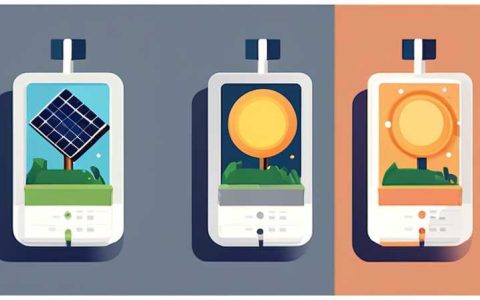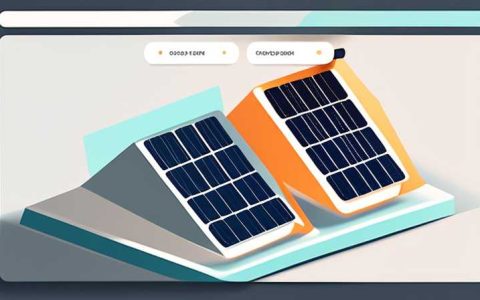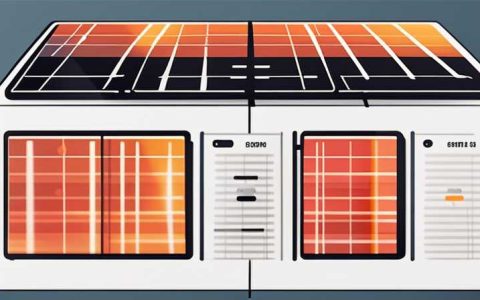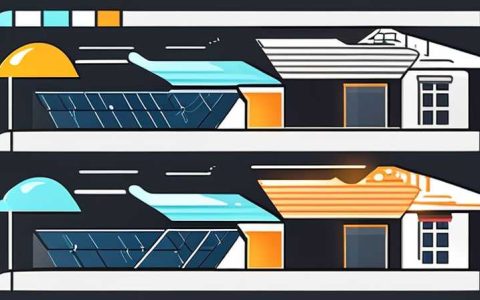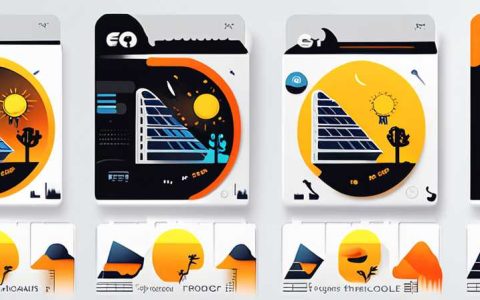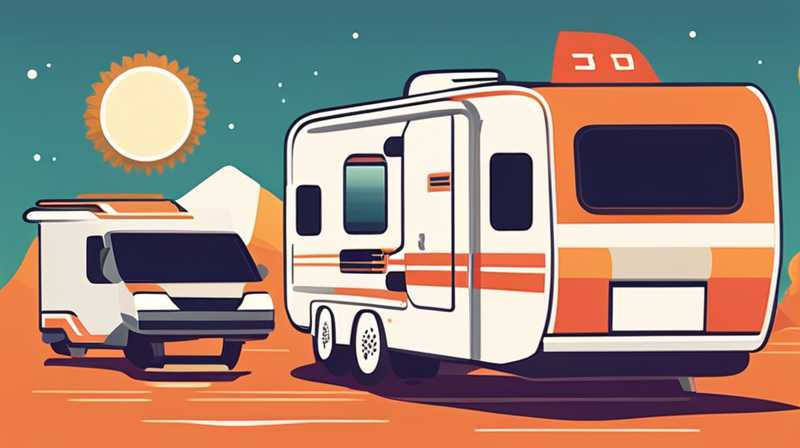
When considering solar energy solutions for your RV, it’s essential to evaluate several factors, including 1. power requirements, 2. type of solar panels, 3. battery storage options, 4. solar charge controllers. The power requirements dictate the overall setup’s scale and capacity, while the type of solar panels available in the market varies in efficiency and price. Another critical point is the selection of appropriate battery storage systems to ensure a reliable energy supply and the utilization of solar charge controllers to optimize the energy management system. Selecting the right components based on these aspects will ensure an efficient and effective solar energy system for your recreational vehicle.
1. POWER REQUIREMENTS
Understanding power requirements is pivotal when designing a solar energy system for an RV. Power requirements encompass energy consumption represented in watt-hours (Wh). Each appliance in the RV consumes a specific amount of energy, and knowing this consumption can help in determining the total energy needed on a daily basis. Common RV appliances include refrigerators, lights, fans, and electronic devices; each contributes to the overall power demand. Therefore, it’s vital to create a detailed list of the appliances you plan to use, along with their wattage and estimated usage hours.
For instance, a typical RV refrigerator may consume about 100-200 Wh daily, while LED lights can average around 10 Wh per hour. By calculating the cumulative power needs for all devices, you will develop a clearer understanding of the energy production required from your solar setup. Once the daily power requirement is established, it will be easier to decide the number of solar panels and batteries needed, ensuring the systems are capable of generating and storing adequate energy to meet your needs.
2. TYPE OF SOLAR PANELS
Different types of solar panels available in the market each serve specific purposes and efficiency levels. The most common types include monocrystalline, polycrystalline, and thin-film solar panels. Monocrystalline panels are known for their higher efficiency and longevity, making them a preferred choice among RV owners, particularly for setups with limited space. Their higher power output per square foot allows for more energy production, even in shaded conditions.
Polycrystalline panels, while slightly less efficient, offer the advantage of being less expensive than monocrystalline panels. They are constructed from multiple silicon crystals, leading to some sacrifice in performance but also being widely adopted due to cost-effectiveness. Thin-film solar panels provide an alternative option, being lightweight and flexible, making them suitable for unique installation scenarios in RVs, although they generally have lower efficiencies compared to their crystalline counterparts. When choosing the type of solar panel, considerations related to budget, available space on the RV’s roof, and energy needs should guide your decision.
3. BATTERY STORAGE OPTIONS
Battery storage systems play a crucial role in ensuring that the energy harnessed from solar panels is readily available for both immediate and future use. Popular battery types include lead-acid (AGM and flooded) and lithium-ion batteries, each with distinct advantages and disadvantages. Lead-acid batteries, while less expensive, typically have a shorter lifespan and require more maintenance. However, they are a well-established technology for many RV users, offering a balanced performance for moderate energy demands.
Lithium-ion batteries, on the other hand, have gained significant popularity due to their higher energy density, lighter weight, and longer life span compared to lead-acid options. These batteries can discharge deeper without damage, allowing for greater utilization of their capacity. The initial investment may be higher, but their longevity and efficiency can make them a more cost-effective solution in the long run. Additionally, advancements in technology continue to reduce the cost of lithium batteries, making them increasingly accessible for RV owners. Choosing the correct battery technology based on expected usage patterns and budget constraints is decisive for optimizing an RV’s solar power system.
4. SOLAR CHARGE CONTROLLERS
Solar charge controllers are essential components of any solar installation in an RV. These devices regulate the electricity flowing into and out of the battery, preventing overcharging and helping to extend battery life. There are mainly two types of charge controllers: PWM (Pulse Width Modulation) and MPPT (Maximum Power Point Tracking).
PWM charge controllers are more affordable and relatively simple, making them suitable for smaller systems with lower power outputs. However, they are less efficient than MPPT controllers, especially in situations with a variable power supply. MPPT controllers maximize the energy harvest from the solar panels, adjusting their output to match the optimal voltage for charging the batteries. This results in higher efficiency, especially under conditions where solar panel voltage is significantly higher than battery voltage.
When selecting a solar charge controller, one must consider the total power output from the solar panels compared to the energy storage capacity of the associated battery. Matching these specifications will lead to a well-balanced system that can efficiently manage the energy sourced from solar panels and ensures that battery performance is maximized.
5. ADDITIONAL CONSIDERATIONS
When assessing solar energy setups for RVs, several other factors warrant attention. First, understanding local regulations and limitations regarding solar installations in RV parks or areas can guide your choices. Some parks may have specific requirements or weight limitations regarding solar panel setups, informing your planning process.
Second, maintenance and usability should factor into your decision, as regular inspections can help prevent any long-term inefficiencies. Periodic cleaning of solar panels and checking battery health ensures that the entire system continues to operate optimally during your travels. Furthermore, it’s beneficial to consider integrating an inverter into your system, which converts the direct current (DC) energy stored in batteries into alternating current (AC) for use by standard appliances. This complements your entire solar setup, allowing for a greater range of appliance usage within your RV.
FREQUENTLY ASKED QUESTIONS
WHAT IS THE COST OF INSTALLING A SOLAR SYSTEM IN AN RV?
The price of installing a solar energy system in an RV can vary dramatically based on several factors, including the type and number of solar panels, the wattage of the batteries, and the overall complexity of the system. A basic setup could range from $1,000 to $3,000, which might include 100 to 300 watts of solar panels, a standard charge controller, and appropriate batteries. However, those looking for more robust solutions can expect to invest $5,000 or more, especially when opting for higher efficiency components like lithium-ion batteries and advanced charge controllers. It’s essential to factor in the additional expenses for installation labor if employing a professional service, as DIY setups can save quite a bit on costs but require a good degree of technical acumen.
HOW MUCH SOLAR POWER DO I NEED FOR MY RV?
Determining the right amount of solar power for an RV necessitates an understanding of energy consumption. To do this, it’s critical to calculate the total watt-hours (Wh) that each electronic device consumes and how many hours per day each piece of equipment will be used. For example, if a refrigerator uses 150 Wh and operates for 24 hours, it will consume 3,600 Wh daily. If lights consume 10 Wh each and are used for 5 hours nightly for 5 lights, that adds another 250 Wh daily consumption. Summing these figures provides an overall image of the daily power requirement, which suitable solar panels must match while factoring 20-30% for inefficiencies and weather variations.
CAN I INSTALL SOLAR PANELS ON MY RV MYSELF?
Installing solar panels on an RV is feasible for those with adequate technical skills and understanding of the installation process. Many RV owners opt for a DIY approach to save on costs and customize their systems according to unique specifications. Key aspects include planning the layout of solar panels on the roof, ensuring that they receive maximum sunlight exposure, and securing the panels properly to prevent wind and vibration damage. Additionally, knowledge of electrical systems is crucial for connecting the solar panels, charge controllers, and battery banks correctly. However, potential installers should consider seeking professional guidance or tutorials, especially if lacking related experience or comfort with electrical systems.
In summary, selecting the optimal solar energy solution for your RV involves careful evaluation of power requirements, types of solar panels, battery storage options, and charge controllers. Each element plays a pivotal role in developing an efficient and functional energy system. Embracing solar energy not only provides greater energy independence but also enhances the RV experience by supporting sustainable travel practices. This comprehensive understanding helps ensure that your solar installation meets your specific needs and supports your adventures on the road. Acquire the right knowledge, tools, and components to create a seamless solar energy system leading to unrivaled outdoor experiences.
Original article by NenPower, If reposted, please credit the source: https://nenpower.com/blog/what-solar-energy-should-i-choose-for-my-rv/



